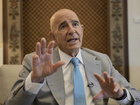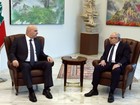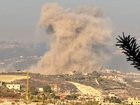Spotlight
Eight violent Israeli airstrikes targeted open areas and valleys on Monday in the southern areas of al-Mahmoudiyeh and al-Jarmaq and the stream of the al-Khardali River in the Nabatieh district, the National News Agency said.
The blasts echoed across vast areas of the south and triggered forest blazes.
 Full Story
Full Story
After a ceasefire reached in Gaza, Lebanese politicians called for the implementation of the Lebanon ceasefire amid almost daily strikes despite a deal reached between Lebanon and Israel in late November, almost a year ago.
President Joseph Aoun has called for indirect negotiations with Israel "to find solutions" as the ceasefire reached a dead-end, with Israel still attacking the country and occupying five hills in its south. Aoun’s initiative aims to urge the U.S. to step up and save the stalled negotiations, Prime Minister Nawaf Salam said, in remarks published Monday in Asharq Al-Awsat newspaper.
 Full Story
Full Story
U.S. envoy Tom Barrack has urged Lebanon to act on the issue of Hezbollah’s disarmament, warning that there might be a “major confrontation” between Israel and Hezbollah if Beirut does not take serious steps.
 Full Story
Full Story
The U.N. Security Council on Friday adopted a statement calling on Lebanon and Israel to respect the 2024 ceasefire agreement and for the instant implementation of U.N. resolutions 1559 and 1701, Al-Jazeera reported.
 Full Story
Full Story
One person was killed in an Israeli drone strike Friday on a car in the southern town of Khirbet Selm.
The attack comes a day after Israel carried out fierce airstrikes across south Lebanon, in one of the heaviest bombing waves since the November ceasefire.
 Full Story
Full Story
Senior military leaders from the United Nations and three countries gathered Oct. 15 in Naqoura, Lebanon for the 11th Pentalateral meeting where officials aligned priorities for “maintaining the cessation of hostilities in southern Lebanon and the disarmament of Lebanese Hezbollah,” the U.S. Central Command said.
“Military leaders from the United States, France, United Nations Interim Force in Lebanon (UNIFIL), and the Lebanese Armed Forces (LAF) discussed the LAF’s continued disarmament operations. The LAF has successfully removed nearly 10,000 rockets, almost 400 missiles, and over 205,000 unexploded ordnance fragments during the past year,” CENTCOM said in a statement.
 Full Story
Full Story
The Health Ministry announced overnight that nine new Tannourine mineral water samples taken from the Lebanese market have tested free of bacteria.
The Ministry however noted that it is yet to receive the results of tests conducted on water samples taken from the company’s production line.
 Full Story
Full Story
Prime Minister Nawaf Salam met Friday with President Joseph Aoun and Parliament Speaker Nabih Berri to discuss the latest developments in the country and the region, including repeated Israeli strikes on the south.
On Thursday, violent Israeli strikes in the south killed one person and wounded seven, with President Aoun saying that the strikes targeted "civilian facilities".
 Full Story
Full Story
A series of violent Israeli airstrikes targeted south Lebanon on Thursday afternoon and evening, killing one person and wounding seven others, with media reports describing them as among the fiercest since the November ceasefire.
 Full Story
Full Story
Israeli airstrikes targeted Thursday the outskirts of the Sidon district town of Bnaafoul and the Ali al-Taher hill near Nabatieh in south Lebanon and and the Bekaa town of Shmestar in the east.
Al-Manar said the Israeli strike on Shmestar hit a building that had been previously targeted.
 Full Story
Full Story




